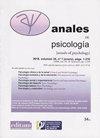The effect of traumatic experiences on attachment styles
IF 1.3
4区 心理学
Q3 PSYCHOLOGY
引用次数: 1
Abstract
Traumatic experiences are destructive experiences that affect individuals in their adulthood, damaging their sense of trust towards themselves, the world and other people, leading them to despair. This study aims to test the effect of childhood traumatic experiences on attachment styles in adulthood and to find out what kind of traumatic experiences explain the attachment styles to what extent. Relational survey method was used in the research and the data were analysed with structural equation modelling. The study group is 804 students aged 17-24. For data collection, Childhood Trauma Questionnaire developed by Bernstein et al. (1997) and Relationship Scales Questionnaire developed by Griffin and Bartholomew (1994) were used. The study has concluded that traumatic experiences have a negative and significant effect on secure attachment and a positive effect on fearful and preoccupied attachment, but they are not a significant predictor of dismissing attachment. As a result of the second model of the relationship between traumatic experiences and secure and insecure attachment dimensions, traumatic experiences have been found to have a negative significant effect on secure attachment but a positive significant effect on insecure attachment. With the third model, three types of traumatic experiences have been examined to explain the attachment styles. Physical, emotional neglect and abuse, and sexual abuse have predicted secure attachment in a negative significant way and insecure attachment style in a positive significant way. The study revealed the effect of childhood traumatic experiences on attachment styles. Las experiencias traumáticas son experiencias destructivas que afectan a los individuos en su edad adulta, dañando su sentido de confianza hacia ellos mismos, el mundo y otras personas, llevándolos a la desesperación. Este estudio tiene como objetivo probar el efecto de las experiencias traumáticas de la infancia sobre los estilos de apego en la edad adulta y averiguar qué tipo de experiencias traumáticas explican los estilos de apego y en qué medida. En la investigación se utilizó el método de encuesta relacional y los datos se analizaron con modelos de ecuaciones estructurales. El grupo de estudio está formado por 804 estudiantes de entre 17 y 24 años. Para la recopilación de datos se utilizó el Cuestionario de trauma infantil desarrollado por Berstein et al. (1997) y el cuestionario de escalas de relación desarrollado por Griffin y Bartholomew (1994). El estudio ha concluido que las experiencias traumáticas tienen un efecto negativo y significativo en el apego seguro y un efecto positivo en el apego temeroso y preocupado, pero no son un predictor significativo de descartar el apego. Como resultado del segundo modelo de la relación entre las experiencias traumáticas y las dimensiones del apego seguro e inseguro, se ha encontrado que las experiencias traumáticas tienen un efecto negativo significativo sobre el apego seguro, pero un efecto positivo significativo sobre el apego inseguro. Con el tercer modelo, se han examinado tres tipos de experiencias traumáticas para explicar los estilos de apego. La negligencia y el abuso físico, emocional y el abuso sexual han predicho un apego seguro de una manera negativa significativa y un estilo de apego inseguro de una manera positiva significativa. El estudio reveló el efecto de las experiencias traumáticas de la infancia en los estilos de apego.创伤经历对依恋类型的影响
创伤性经历是影响个人成年期的破坏性经历,破坏他们对自己、世界和他人的信任感,导致他们绝望。本研究旨在检验童年创伤经历对成年依恋类型的影响,并探讨什么样的创伤经历能在多大程度上解释依恋类型。研究采用关系调查法,采用结构方程模型对数据进行分析。研究小组是804名年龄在17-24岁之间的学生。数据收集使用Bernstein et al.(1997)开发的童年创伤问卷和Griffin and Bartholomew(1994)开发的关系量表问卷。研究得出结论,创伤经历对安全型依恋有显著的负面影响,对恐惧型依恋和心事型依恋有积极影响,但对解除型依恋没有显著的预测作用。根据创伤经历与安全、不安全依恋维度关系的第二种模型,创伤经历对安全依恋维度具有显著的负向影响,而对不安全依恋维度具有显著的正向影响。在第三个模型中,三种类型的创伤经历被用来解释依恋类型。身体、情感忽视、虐待和性虐待对安全依恋有负向显著的预测作用,对不安全依恋有正向显著的预测作用。该研究揭示了童年创伤经历对依恋类型的影响。Las experiencias traumáticas son experiencias destructivas que affect a los individuos en suedad adulta, dañando susentido de confianza hacia ellos mismos, el mundo y otras personas, llevándolos a la desesperación。Este estudio tiene como objective - probel effects of las expericicias traumáticas de la la ancianci.soanci.los estilos de apego en la edanci.edu.cn成人平均体验体验traumáticas解释los estilos de apego y en questuciedmedida。En la investigación se utilizó el - macimtodo de encuesta的关系,与损失数据的分析,与模型的计算结构。El grupo de estudio estformado poro 804 students de entre 17 y 24 años。Para recopilación de datos se utilizó el创伤儿童调查问卷Berstein等人(1997)和el创伤儿童调查问卷relación desarrollado por Griffin y Bartholomew(1994)。研究人员得出结论:体验对自我自我的影响为负向显著,自我自我的影响为负向显著,自我自我的影响为正向显著,自我自我的影响为负向显著,自我自我的影响为负向显著,自我自我的影响为负向显著,自我自我的影响为负向显著。Como resultado del segundo modelo de la relación entre lasencicias traumáticas通过lasdimensiones del self - seguro e - seguro,可以看出,contrado que lasencicias traumáticas对负显著性sogiveel self - seguro有效,对正显著性sogiveel self - seguro有效。与tercer模型相比,我们的检查结果显示经验不足traumáticas para explicit los estilos de apego。疏失性虐físico、情绪性虐与性虐相比,自我自尊性虐与自我自尊性虐显著负相关,自我自尊性虐与自我自尊性虐显著正相关。El estustudio reveló El effect de las experiencias traumáticas de la infancia en los estilos de apego。
本文章由计算机程序翻译,如有差异,请以英文原文为准。
求助全文
约1分钟内获得全文
求助全文
来源期刊

Anales De Psicologia
医学-心理学
CiteScore
3.30
自引率
5.90%
发文量
57
审稿时长
4-8 weeks
期刊介绍:
Anales de Psicologia / Annals of Psychology is a multidisciplinary journal of the various thematic areas of scientific psychology. It publishes original research articles and theoretical review in any of its basic, applied and methodological areas included within psychology.
Publishing, financing, marketing and distribution corresponds Editum: Editions of the University of Murcia (Spain). The organizational guidelines and editorial policies come from the Editorial Team (elected for four years by the Areas and / or Departments of Psychology at the University of Murcia) and the Editorial Board, composed of scholars and experts from different universities and institutions national and international. It is published in print (ISSN: 0212-9728) since 1984 and in Internet publishing (web) (ISSN: 1695-2294) since 2000. Available online full text in pdf from the vol. 1 1984.
Anales de Psicologia / Annals of Psychology maintains a system of exchange with other journals and publications of psychology in the world. Through an free exchange agreement with their respective publishers or entities responsible for editing, these journals and publications are received at the University of Murcia (Biblioteca "Luis Vives", near the Faculty of Psychology) and in return, our journal is sent to libraries and educational and research institutions such centers responsible for editing.
 求助内容:
求助内容: 应助结果提醒方式:
应助结果提醒方式:


